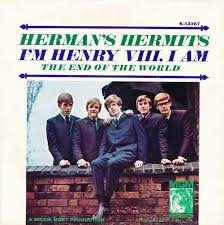This is a list of notable events in music that took place in the year 1909.

Music hall is a type of British theatrical entertainment that was most popular from the early Victorian era, beginning around 1850, through the Great War. It faded away after 1918 as the halls rebranded their entertainment as variety. Perceptions of a distinction in Britain between bold and scandalous music hall entertainment and subsequent, more respectable variety entertainment differ. Music hall involved a mixture of popular songs, comedy, speciality acts, and variety entertainment. The term is derived from a type of theatre or venue in which such entertainment took place. In North America vaudeville was in some ways analogous to British music hall, featuring rousing songs and comic acts.
Joseph Tabrar was a prolific English writer of popular music hall songs. His song "Daddy Wouldn't Buy Me a Bow Wow" (1892) became Vesta Victoria's first major popular success.

"I'm Henery the Eighth, I Am" is a 1910 British music hall song by Fred Murray and R. P. Weston. It was a signature song of the music hall star Harry Champion.

Florrie Forde was an Australian-born British vaudevillian performer and popular singer, notable in music hall and pantomime. From 1897 she lived and worked in the United Kingdom, where she found her greatest success, as one of the most popular stars of the early 20th century as a music hall entertainer and recording artist.

"Under the Anheuser Bush" is a beer garden song commissioned by the Anheuser-Busch brewing company in 1903. With music by Harry Von Tilzer and words by Andrew B. Sterling, the title contains a pun on the surnames of the company's founders.
Robert Patrick Weston was an English songwriter. He was responsible for many successful songs and comic monologues between the 1900s and 1930s, mostly written in collaboration with other writers, notably Fred J. Barnes and Bert Lee, and performed successfully by Harry Champion, Stanley Holloway, and Gracie Fields, among others.
Alfred James Walden, known professionally as Harry Wincott, was an English songwriter.
Charles William Murphy was a prolific British composer of music hall and musical theatre tunes.
George Alexander Stevens was an English songwriter and musical show director. In more than 60 years of songwriting he had more than 2000 songs published under the names "G. Alex Stevens", 'Geo A Stevens' and "George A. Stevens". He was known as a writer of music hall songs.
Fred Godfrey was the pen name of Llewellyn Williams, a World War I songwriter. He is best known for the songs "Take Me Back to Dear Old Blighty" (1916) and "Bless 'Em All" (1917), a 1940s hit recorded by George Formby that can be found on many war films.
Bennett Scott was an English writer of music hall songs.
George Le Brunn was an English composer of popular songs, active during the heyday of the music halls.

"Good-bye-ee!" is a popular song which was written and composed by R. P. Weston and Bert Lee. Performed by music hall stars Florrie Forde, Daisy Wood, and Charles Whittle, it was a hit in 1917.
William Frederick Bridgen, known professionally as Fred W. Leigh, was an English lyricist who co-wrote several popular music hall songs of the early twentieth century,
Charles William Collins was an English songwriter, who composed the music for several famous music hall songs of the early twentieth century.
Edward William Rogers was an English songwriter for music hall performers of the late 19th and early 20th centuries.
Ernest Worton David was an English songwriter and music publisher.
John Patrick Harrington was an English lyricist of music hall songs, and writer.
Walter Augustus Pink was an English music hall performer, writer and theatre producer.




